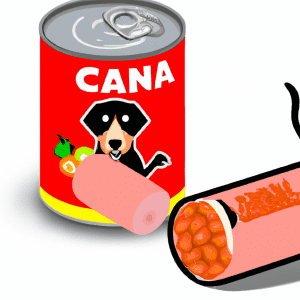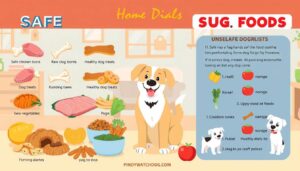Eggplant is a popular vegetable, but can dogs eat it? The answer is yes, eggplant is generally safe for dogs to eat. However, there are some things to consider before adding eggplant to your pup’s diet. In this article, we will discuss the nutritional benefits of eggplant for dogs, the safety precautions to take when feeding eggplant to your pup, and how to make sure your pup enjoys their eggplant meal.
Is Eggplant Safe for Dogs? Exploring the Pros and Cons of Feeding Eggplant to Canines
When it comes to feeding your pup, eggplant might not be the first thought that comes to mind – and that’s totally understandable. But, is eggplant actually safe for dogs? Let’s take a look at the pros and cons of feeding eggplant to canines. Pros Eggplant is a great source of dietary fiber, vitamins, and minerals that can help keep your pup healthy. It’s also low in calories and fat and can be a great way to add variety to your pup’s diet.
Cons Eggplant can be difficult to digest and could cause an upset stomach. Additionally, some dogs may be allergic to eggplant, so it’s important to be aware of any potential allergic reactions. Additionally, eggplant can contain solanine, which is a toxic alkaloid. If consumed in large quantities, solanine can be harmful to dogs. So, is eggplant safe for dogs? The answer is yes, but with certain precautions.
If you’re interested in adding eggplant to your pup’s diet, it’s best to start with a small amount and monitor your pup for any allergic reactions. Additionally, it’s important to cook the eggplant first as raw eggplant can be difficult to digest. Finally, make sure to avoid feeding your pup large quantities of eggplant as this could lead to solanine toxicity. Overall, eggplant can be a great addition to your pup’s diet as long as it’s done safely and in moderation. Always talk to your vet before introducing any new foods to your pup’s diet.
What Are the Health Benefits of Feeding Eggplant to Dogs?
Eggplant is a great addition to your pup’s diet. It’s packed with nutrients, including vitamins A, B, C, and K, as well as fiber and potassium. Here are some of the health benefits of feeding eggplant to dogs: 1. Boosts Digestive Health: Eggplant is rich in dietary fiber, which helps keep your pup’s digestive system healthy and functioning properly. Fiber helps to move food through the digestive tract and can help reduce constipation and diarrhea. 2. Improves Heart Health: Eggplant is a great source of potassium, which helps to regulate blood pressure and reduce the risk of cardiovascular diseases.
Potassium is also essential for bone health and nerve function. 3. Fights Cancer: Eggplant also contains antioxidants that can help protect against certain types of cancer. These antioxidants can also help to reduce inflammation, which can be beneficial for dogs with arthritis or other joint problems. 4. Strengthens Immune System: Eggplant is also a great source of vitamin C, which helps to boost the immune system.
Vitamin C helps to protect against infections and diseases, as well as reduce inflammation. If you’re looking for a nutritious way to add variety to your pup’s diet, eggplant is a great choice! Just be sure to feed it in moderation and always consult with your veterinarian before adding new foods to your pup’s diet.
How to Prepare Eggplant for Your Dog – A Guide to Cooking Eggplant for Dogs
Cooking eggplant for your pup is a great way to add some variety to their diet. Eggplant is packed with essential nutrients and can even help improve digestion. But before you get cooking, it’s important to prepare the eggplant properly. Here’s how to do it. First, give the eggplant a good wash. Use a vegetable brush to remove any dirt and debris. Make sure to get rid of any blemishes or bruises. Next, slice the eggplant into small cubes.
This will help it cook faster and make it easier for your pup to chew and digest. Once the eggplant is cut, it’s time to cook it. Steaming is generally the best option as it helps retain the eggplant’s nutrients. If you don’t have a steamer, you can also cook the eggplant in a pan with a bit of olive oil. Once the eggplant is cooked, you can serve it as-is or mix it with other ingredients such as ground beef or sweet potatoes.
Just make sure to keep it in small chunks so it’s easier for your pup to eat. And there you have it – the perfect way to prepare eggplant for your pup. Now get cooking and let your pup enjoy the deliciousness of eggplant!
Can Dogs Eat Eggplant? The Risks and Benefits of Feeding Eggplant to Dogs
Can dogs eat eggplant? It’s an intriguing question that many dog owners have asked themselves. After all, eggplants are a tasty, nutritious vegetable for humans and it’s natural to wonder if dogs can enjoy them too. The answer is yes, dogs can eat eggplant in moderation. But, before you start adding it to your pup’s meals, there are a few things to consider. Eggplant can be a healthy addition to a dog’s diet, but it also has some potential risks. Let’s explore the pros and cons of feeding eggplant to your pup.
The Benefits of Feeding Eggplant to Dogs Eggplant is low in calories and fat, but high in fiber and essential vitamins and minerals. It’s also rich in antioxidants, which can help protect your pup’s cells from damage. Feeding eggplant to your pup can also help promote healthy digestion, and the fiber content may even help prevent constipation. The Risks of Feeding Eggplant to Dogs Eggplant can be difficult for dogs to digest, so it’s important to feed it in small, cooked portions.
It’s also important to make sure the eggplant is cooked properly. Raw eggplant contains solanine, a naturally occurring compound that can be toxic to dogs in large doses. It’s also important to watch for signs of an allergic reaction. Eggplant can cause an allergic reaction in some dogs, so watch for signs such as itching, swelling, or vomiting. If you notice any of these signs, stop feeding eggplant and consult your veterinarian.
In conclusion, dogs can safely eat eggplant in moderation. It can be a nutritious addition to their diet, but it’s important to follow the guidelines outlined above to ensure your pup’s safety. If you have any questions or concerns, it’s always best to consult your veterinarian.
What Are the Signs of Eggplant Allergy in Dogs?
If your pup has an eggplant allergy, you’ll likely notice a few tell-tale signs. Here are some of the most common symptoms to look out for: – Itchiness and redness of the skin – Skin rashes and hives – Swollen paws or face – Excessive scratching or licking – Vomiting or diarrhea – Difficulty breathing – Anaphylaxis (in severe cases) If your pup shows any of these symptoms after eating eggplant, contact your vet right away. They’ll be able to diagnose the allergy and help you find a suitable treatment plan.
How to Feed Eggplant to Dogs – A Guide to Safely Adding Eggplant to Your Dog’s Diet
If you’re looking for a new way to add some variety to your pup’s diet, eggplant might be just the thing. It can be a delicious and nutritious treat for your pup, but it’s important to make sure you feed it to them safely. Here’s a guide to safely adding eggplant to your pup’s diet. 1. Choose a ripe eggplant. When selecting an eggplant for your pup, look for one that’s ripe but not overly soft. If it’s too soft, it might not be safe for your pup to eat. 2. Rinse and cut. Before feeding eggplant to your pup, you’ll need to rinse it off and then cut it into small, bite-sized pieces. This will make it easier for your pup to eat. 3. Cook it. Eggplant should always be cooked before it’s fed to your pup. You can either boil it in water or bake it in the oven. 4. Add it to your pup’s meal. Once the eggplant is cooked, you can add it to your pup’s regular meal or serve it as a snack. 5. Monitor your pup’s reaction. As with any new food, you’ll want to keep an eye on your pup to make sure they don’t have any adverse reactions. If they do, stop feeding them eggplant and call your vet for advice. By following these steps, you can safely feed eggplant to your pup and give them a delicious, nutrient-rich treat. Enjoy!
What Are the Nutritional Benefits of Feeding Eggplant to Dogs?
Feeding eggplant to your dog can be a great way to give them some extra nutrients in their diet. Eggplant is high in fiber, which helps keep your pup’s digestive system healthy and can help with weight management. It also contains important vitamins and minerals like potassium, magnesium, and vitamin B 1. Eggplant is also a good source of antioxidants, which help protect against cell damage and disease. Eggplant is low in calories and fat, so it won’t add extra calories to your pup’s diet. And it’s an excellent source of dietary fiber, which helps keep your pup’s digestion regular. All these benefits make eggplant an excellent choice for a nutritious snack or meal for your pup!
Should I Feed Eggplant to My Dog? Exploring the Pros and Cons of Adding Eggplant to Your Dog’s Diet
Adding eggplant to your dog’s diet can be a great way to give them a boost of nutrition, but there are a few things you should consider before making this addition. Here’s a look at the pros and cons of feeding eggplant to your pup. Pros Eggplant is a great source of fiber, which can help your dog to maintain a healthy digestive system. It also contains a variety of vitamins and minerals, such as Vitamin B6, Vitamin C, magnesium, and manganese.
This can help support your pup’s overall health and well-being. Eggplant is also a low-calorie food, making it a good option for dogs that need to watch their weight. Cons Eggplant is a member of the nightshade family, which includes potatoes, tomatoes, and peppers. While these vegetables are generally safe for dogs to eat in small amounts, some dogs may experience stomach upset if they consume too much of them.
There is also the potential for allergies, so it’s best to introduce eggplant slowly and monitor your pup’s reaction to it. Overall, eggplant can be a great addition to your pup’s diet as long as it’s done carefully. As with any new food, it’s always a good idea to consult your vet before making any changes to your dog’s diet.
Is Eggplant Harmful to Dogs? Exploring the Risks of Feeding Eggplant to Your Canine
As a dog parent, you want to make sure your pup is safe and healthy. That’s why it’s important to know the potential risks of feeding your canine certain foods. One food that is commonly questioned is eggplant. Is eggplant harmful to dogs? Let’s take a look at the risks of feeding this vegetable to your furry friend. Eggplant is generally safe to feed your pup, but it should only be fed in moderation. It’s high in fiber, which can help with digestion and make your dog feel full longer.
But it’s also high in sugar, so it should be fed in small amounts. Eggplant also contains solanine, a toxin that can be toxic to dogs in large doses. This toxin can be found in the leaves and stems of the eggplant, so make sure to remove those before feeding it to your pup. It’s also important to remember that some dogs may have allergies to eggplant. If your pup starts to show signs of an allergic reaction, stop feeding them eggplant and contact your vet.
In short, eggplant can be safe for dogs in moderation as long as it’s prepared properly. Just make sure to remove the leaves and stems, and watch for any signs of an allergic reaction. If you’re ever unsure, contact your vet for more advice.
1Is Eggplant a Healthy Food Option for Dogs? Exploring the Nutritional Benefits of Eggplant for Dogs
Eggplant is often thought of as a strictly human-only food, but believe it or not, this tasty veggie can actually be a healthy snack for your pup! That’s right, your furry friend can benefit from the nutritional benefits of eggplant. Let’s take a look at how this veggie can improve your pup’s health. First and foremost, eggplant is a great source of fiber, which is important for maintaining a healthy digestive system.
Fiber helps to regulate the digestive process and can help keep your pup’s bowel movements regular. Additionally, fiber is known to help reduce cholesterol levels in dogs, which can reduce the risk of developing heart disease. Eggplant is also an excellent source of vitamins and minerals, including vitamins A, B6, C, and K. Vitamin A is important for maintaining good vision and healthy skin and coat, while vitamin B6 is necessary for proper brain development. Vitamin C helps to boost immunity and vitamin K is essential for blood clotting. Eggplant is also low in fat and calories, making it a great choice for pups who are trying to maintain a healthy weight. However, it is important to note that eggplant should only be fed in moderation as too much of it can cause digestive issues in some dogs. When preparing eggplant for your pup, it is important to make sure that it is cooked thoroughly. Raw eggplant can be difficult for dogs to digest, so it’s best to avoid feeding it to them in this form. Additionally, make sure to remove the skin and any seeds before feeding them to your pup, as these can be hazardous. Overall, eggplant can be a tasty and nutritious treat for your pup. While it is important to only feed it to your pup in moderation, it can certainly be part of a healthy diet. So go ahead and let your pup indulge in this delicious veggie from time to time!
In conclusion, it is not recommended to feed your dog eggplant as it can be dangerous to their health. Eggplant can cause digestive issues and can even be toxic in large amounts. If you think your dog has eaten eggplant, contact your vet immediately.




